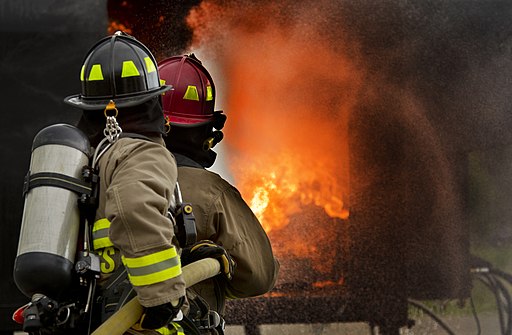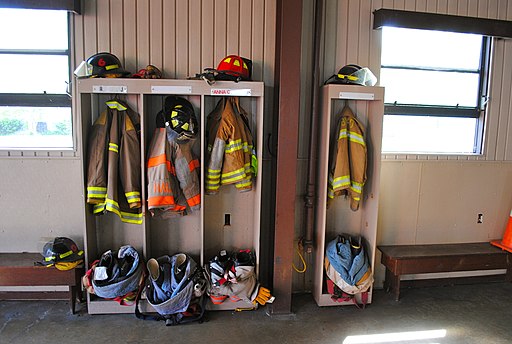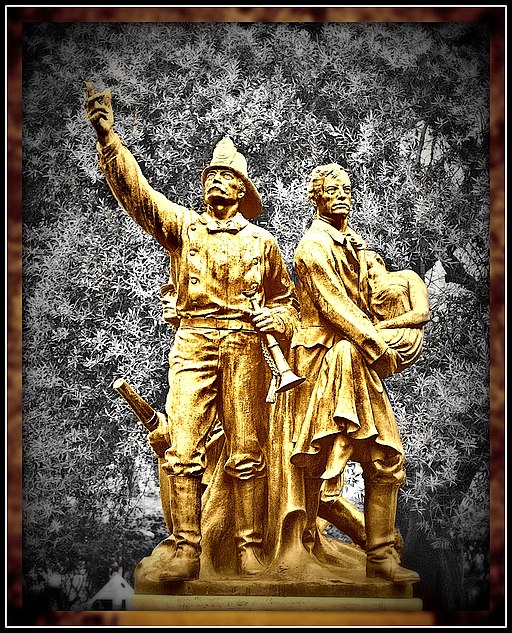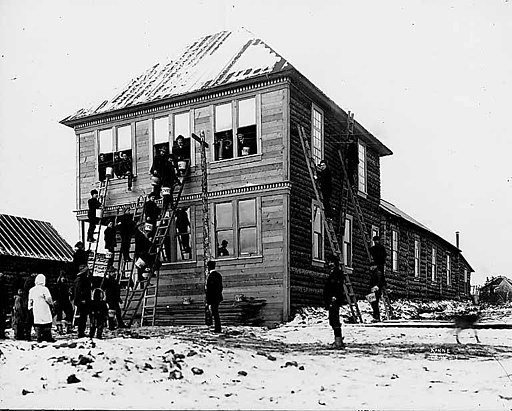In 1735, Benjamin Franklin founded the Union Fire Company in Philadelphia, becoming the first organized volunteer firefighting group in the United States. This group of concerned citizens joined forces to protect their community from fires, which were a common occurrence back in the early days of American cities.
So why did they choose to volunteer their time and risk their lives to fight fires? And what motivates firefighters today to continue this tradition of selfless service?
Let’s explore the history of volunteer firefighters and delve into the reasons why these brave individuals choose to volunteer for this important and often dangerous job.

Putting their training to the test: Members of the Burlington Fire Department and Minot Air Force Base Fire Department bravely tackle a simulated blaze in Burlington, North Dakota. Despite being an all-volunteer force, the Burlington Fire Department responds to 50-70 calls annually. They handle everything from wildland to structure fires.
What’s the difference between a volunteer firefighter and a career firefighter?
According to data from the National Fire Protection Association (NFPA), in 2020, about 69% of firefighters in the United States were volunteers. The remaining 31% were career firefighters, who are paid for their work. The proportion of volunteer firefighters varies from state to state. Some states have a higher percentage of volunteer firefighters than others.
It’s important to note that the role of volunteer firefighters has changed over time. In the past, most firefighters in the United States were volunteers. However, as the population has grown and the demands on the fire service have increased, more and more communities have transitioned to a mix of paid and volunteer firefighters. Despite this trend, volunteers continue to play a vital role in the fire service. Many communities rely heavily on them to provide essential services.

Ready for action. The bunker gear of the Bishopville Volunteer Fire Department stands at the ready to protect and serve the community. Lee Cannon from Bayville aka West Fenwick, DE, USA, CC BY-SA 2.0 via Wikimedia Commons.
The main difference between a volunteer firefighter and a career firefighter or a full-time firefighter is that a volunteer firefighter does not receive an hourly wage or salary for their fire service.
Volunteer firefighters typically hold other jobs and serve as firefighters on a part-time basis. They often respond to emergencies during their off-hours. In contrast, regular or career firefighters are full-time employees who are paid to fight fires and respond to emergencies.
Another key difference between volunteer and regular firefighters is the level of training and experience they may have. While both types of firefighters must undergo extensive training and meet certain qualifications, regular firefighters may have more experience and training due to the fact that they are working in the field full-time. Additionally, regular firefighters may have access to more resources and equipment due to their local fire department’s budget.
Even though there are differences between volunteer and regular firefighters, both groups play a vital role in safeguarding their communities from fires and other emergencies.
What motivates a firefighter to volunteer?
There are many possible reasons why an individual might prefer a volunteer firefighter position.
A sense of duty and desire to serve their community
Many people are motivated to become volunteer firefighters because they want to help others. They also want to make a difference in their community.
A desire to learn new skills
Firefighting requires a wide range of knowledge and skills, including how to use specialized equipment, how to perform search and rescue operations, and how to provide medical care. For some people, the opportunity to learn and develop these skills is a major motivator.
A sense of adventure
Firefighting can be an exciting and challenging career. For some, the thrill of responding to emergencies and helping people in need is a major motivator.
A chance to be part of a team
A volunteer firefighter works closely with other members of his team. For some, the opportunity to be part of a team and contribute to a shared goal is a major motivator.
A chance to make a difference
A volunteer firefighter has the opportunity to make a real difference in the lives of others. For some people, this is a major motivator. Whether he is saving a life, providing comfort and support to someone who is in need, or simply making a positive impact in their community, a volunteer firefighter often feel that he is making a difference in the world.
Over the past three decades, there has been a 12% decline in the number of volunteer firefighters in the United States, according to the National Fire Protection Association. Despite this decline, the demand for firefighting services has increased significantly, with a 240% increase in calls for service.
To meet this increased demand, the number of career firefighters has increased by 43%. However, many fire departments are still struggling to keep up with the demands of their communities due to the shortage of volunteers. Nevertheless, volunteer firefighters continue to bring a positive impact on their communities.

Honoring our heroes. A statue of volunteer firefighters stands proud in Washington State Park, San Francisco. It pays tribute to the selfless individuals who risk their lives to protect our communities.Loco Steve, CC BY 3.0 via Wikimedia Commons
The impact of volunteer firefighters on their communities
Volunteer firefighters respond to emergencies in a timely and effective manner, and provide a valuable service to their communities by helping to protect life and property.
One of the major benefits of using volunteer firefighters is the cost savings. Because they are not paid, they can help communities save money on salaries and other expenses related to paid firefighters. This can be especially important for smaller communities or those with limited budgets.
In addition to cost savings, volunteer firefighters can also provide enhanced services and support to their communities. Because they are often local residents who are personally invested in their community, they may be more motivated to go above and beyond in their duties. This can lead to a higher level of service provided.
They may also be more familiar with the layout of the community and the specific needs of its residents, which can be helpful in responding to emergencies.
The presence of volunteer firefighters can have a positive impact on community morale and spirit. When people see their neighbors and community members working together to protect and serve their community, it creates a sense of pride and unity. This can be especially important in times of crisis, when people may be feeling vulnerable or uncertain.
The sense of community and support that volunteer firefighters provide can help to boost morale and foster a sense of belonging.

Bravely ascending into action: Men of the Council, Alaska Volunteer Fire Department climb ladders to simulate fighting a fire during a drill in 1907.
Volunteer firefighters play a vital role in our communities and fire departments. They are motivated by a desire to help others. They also have a sense of community and camaraderie within the fire service. The opportunity for personal growth and development is also a factor.
While volunteering as a firefighter can be physically and emotionally demanding, it also brings great personal satisfaction. There is also an opportunity for training and advancement. In addition to the cost savings and enhanced services they provide, volunteer firefighters also have a positive impact on community morale and spirit.
It is important to recognize and support these selfless individuals who choose to serve their communities as volunteer firefighters. Despite the challenges they face, the need for volunteers in the fire service continues. Local fire departments are always in need of dedicated individuals to fill volunteer firefighter positions and support emergency services.


